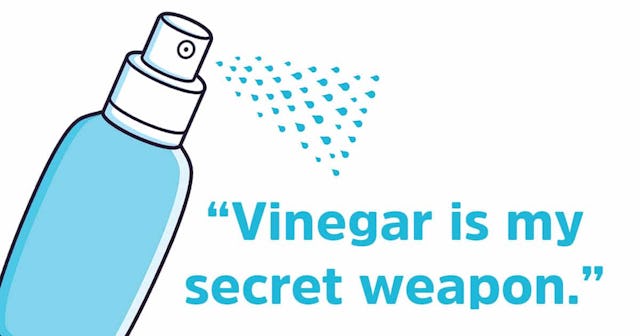I Have My Own Cleaning Business—Why Vinegar Is My Secret Weapon

For many years, my full-time job and passion was my cleaning business. I closed the business to stay home and raise babies, but now that all three of my kids are in school, I have added residential cleaning back to my list of part-time jobs. I have always prided myself on providing trustworthy and quality work. I am also proud to tell people that I only use eco-friendly cleaning supplies and products. I am adamant about it, actually. I care too much about the planet, myself, and my kids to use toxic chemicals when much safer and equally-effective options are available. Even though my job description has shifted over the years, one thing has remained the same: Vinegar is my secret weapon.
Vinegar is a safe, inexpensive, and versatile cleaning agent and something most of us already have in the pantry. There are lots of vinegars to choose from, but the one best suited for cleaning and the one I am referring to throughout this article is white vinegar because it is the most acidic and makes it a potent cleaner. In fact, full-strength vinegar may be too strong for some surfaces, so diluting it with water or using apple cider vinegar is the way to go. For an even more acidic cleaner, use cleaning vinegar. It has 20% more acid than regular white vinegar. A simple water/vinegar mix will effectively clean most surfaces in your house.
Use caution on some surfaces. Granite, soapstone, and marble countertops, untreated grout, and stone floors do not mix well with vinegar. The acid can cause pitting and loss of shine. However, vinegar is magic and works in more situations than not.
Bathroom
A simple solution of two parts vinegar, one part water in a spray bottle makes a great multi-purpose cleaner you can use anywhere in the house. But in the bathroom, mirrors, tubs, showers, glass, and tile can be cleaned with this solution. Because vinegar is so acidic, it is great at eating soap scum and brines left by hard water. I have even had luck getting stains from tub crayons off of shower walks. Spraying your shower after each use will help prevent mold and mildew growth too. For really tough jobs in the shower or tub, I have made sprays with a mixture that was one part plant-based liquid dish soap and one part vinegar. Adding lemon oil will make your vinegar cleaning solution smell better and work harder because the oil is also antibacterial and antiviral.
Kitchen
Bring your multi-purpose cleaner into the kitchen and clean counters, appliances, and sinks. Vinegar is great at cutting grease and sticky surfaces—like stickers or jelly left on the wall. However, vinegar doesn’t react well to egg-based messes; adding it will make the spill stickier. Use hot water and a cloth to remove the mess, then use vinegar to clean the surface. Vinegar also freshens stinky drains and cleans the inside of dishwashers.
Pro tip: to get your stainless steel surfaces to shine, dab a cloth with vegetable oil, use it to wipe off finger prints and smudges, then wipe the surface clean with another end of the cloth that has been dipped in vinegar. Let dry and enjoy until your kids appear and run their hands all over everything. Oh, and lean in close: your coffee pot is likely growing mold, so wash your pot and run vinegar through your machine to break down scale build up and knock out mold.
Shopify Partners/Burst
Laundry
I am going to go out on a limb, but I have a feeling you have forgotten to put your laundry in the dryer until the next day or that your kids piss on things. I am also going to guess that if you are a wine drinker, you have slopped it on yourself. Vinegar deodorizes mildew towels, stinky gym clothes, and pee-soaked sheets and clothing. It is also a natural fabric softener, so skip the expensive dryer sheets and add up to a cup of vinegar to the final rinse cycle. Vinegar can be used as a substitute for bleach, too, if you want to brighten white cotton socks, shirts, or underwear. Grass and armpit stains are acidic and dissolve when sprayed with vinegar. A paste of baking soda and vinegar can remove red wine stains too. But the more delicate the fabric, the more caution you should use.
Floors
A little goes a long way with hardwood and laminate floors. No more than half a cup to each gallon of hot water is necessary to get your floors clean. And if you don’t want the vinegar smell, add a couple of drops of peppermint oil, lavender, or lemon oil. I personally love the smell of tea tree oil.
Clogged Drains
I refuse to buy those chemical solutions meant to unclog pipes. They are expensive and I have yet to find one that actually works. I feel like I am dumping money down the drain. Literally. An alternative is to do this: pour a pot of boiling water down the clogged or slow draining pipe. Then add a mix that contains one cup water, one cup vinegar, and one cup baking soda. Cover the drain and let everything sit for ten minutes. Follow up with another pot of boiling water. If this doesn’t work, I like to pull things apart; I will remove the drain plug and snake the drain from the top to pull out hair and gunk. I have also turned off the water supply and have unscrewed the U pipe under the sink. Be sure a bowl is under this to catch small leaks and be prepared for grossness. I find it satisfying. You may not.
Skip the fancy and expensive store-bought cleaning products filled with oil-based and toxic promises and get yourself some simple, but powerful white vinegar.